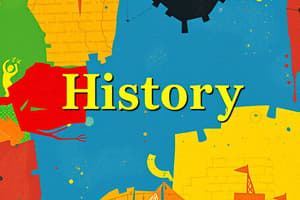Podcast
Questions and Answers
What does history literally mean?
What does history literally mean?
inquiry or knowledge acquired by investigation
Without the study of history, one can accurately understand the past.
Without the study of history, one can accurately understand the past.
False (B)
What are the two stages of man's development in history?
What are the two stages of man's development in history?
Homonization and Humanization
Which of the following is NOT an aspect of history according to subject?
Which of the following is NOT an aspect of history according to subject?
The _____ method is the process of critically examining and analyzing the records of the past.
The _____ method is the process of critically examining and analyzing the records of the past.
What event did the Bud Dajo Massacre in Jolo occur?
What event did the Bud Dajo Massacre in Jolo occur?
What primary theme deals with the records of public events and institutions?
What primary theme deals with the records of public events and institutions?
Economic history is primarily concerned with social movements.
Economic history is primarily concerned with social movements.
Studying history contributes to human _____ and reveals patterns of thoughts and actions.
Studying history contributes to human _____ and reveals patterns of thoughts and actions.
What is one of the purposes of studying history?
What is one of the purposes of studying history?
Flashcards are hidden until you start studying
Study Notes
Understanding History
- History is a record of mankind, emphasizing people's lives in specific times and places.
- It serves as the only introduction to the human future and documents development through homonization and humanization.
- Originates from the Greek word "istoria," meaning inquiry or knowledge from investigation.
Importance of Studying History
- History offers valuable lessons that help understand past events, contributing to personal and collective growth.
- Exact reconstruction of history is impossible, but historians use evidence from artifacts, documents, and accounts to piece together past events.
Historical Method and Historiography
- Historical method involves critically examining past records and evidence.
- Historiography refers to the imaginative reconstruction of history, focusing on writing rather than creating new narratives.
Aspects of History by Subject
- Individual History: Examines individual accomplishments and their contributions to larger historical contexts; includes biographies.
- Local History: Studies a specific geographical area, focusing on cultural and social dynamics within local communities.
- National History: Centers on the development of a nation-state through the collective experiences and struggles of its people.
National History of the Philippines
- Divided into periods: Prehistoric, Precolonial, Spanish, Revolutionary, American, Japanese, Third Republic, Martial Law, and Post-Martial Law.
Notable Historical Events in the Philippines
- Bud Dajo Massacre (March 8, 1906): Approximately 2,000 civilians died.
- Balangiga Massacre (September 28, 1901): American retaliation after resistance in Samar led to the killings of individuals over ten years old.
Themes in History
- Political History: Focuses on public events, government evolution, wars, and diplomatic changes.
- Economic History: Explores how past societies earned a living, produced goods, and managed exchanges.
- Social History: Investigates societal structures, changes, movements, work conditions, and community dynamics.
- Cultural History: Examines the evolution of traditions, customs, and arts in relation to the global context.
Benefits of Studying History
- Fosters socialization and helps individuals understand their identities.
- Forms the basis for national identity and contributes to overall human knowledge.
- Reveals patterns of action and thought that can guide present and future decisions.
Relevance of History
- Personal Relevance: Nurtures identity and values through family and community narratives of freedom, injustice, and achievement.
- Community Relevance: History strengthens communities by anchoring them in human memories and shared traditions.
Key Skills Developed through History
- Critical thinking through analysis of evidence and argumentative exploration.
- Awareness of justice, rights, and liberties, which are vital for fostering civic responsibility.
Studying That Suits You
Use AI to generate personalized quizzes and flashcards to suit your learning preferences.




